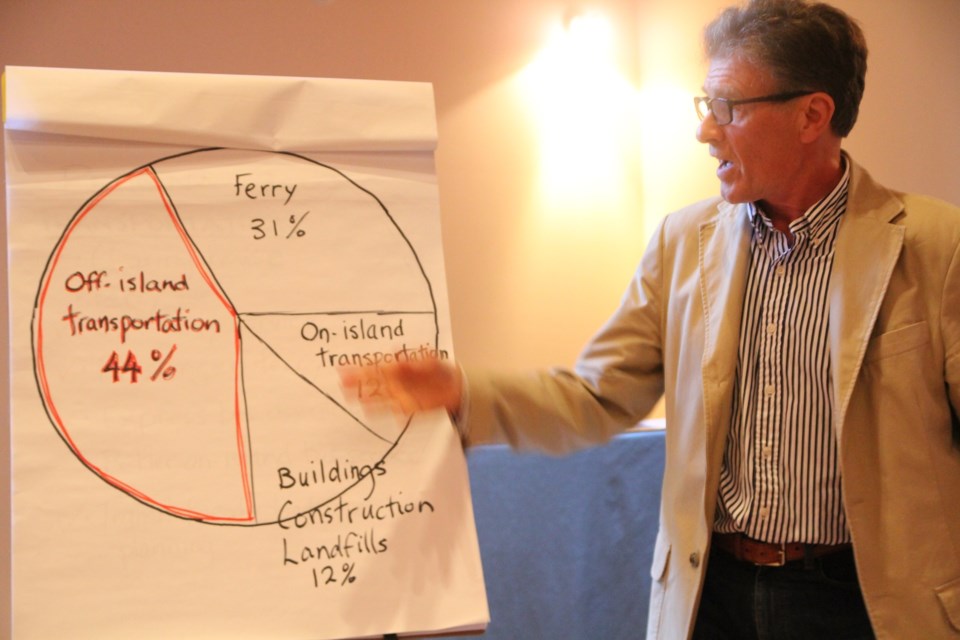Stop subsidizing fossil fuels and create major incentives for electrification in all its guises. Stop looking at the economy as something that needs to be perpetually growing and focus instead, on the quality of life of Canadians. Look at global best practices on cutting carbon emissions, copy, paste and implement in Canada. These are just a few of the ideas put forward on Friday night by the roughly fifty Bowen Islanders that showed up to Cates Hill Chapel to participate in a “Democracy Talk” on climate change with West Vancouver-Sunshine Coast and Sea-to-Sky Country Member of Parliament Pamela Goldsmith-Jones.
The event kicked off with Goldsmith-Jones giving a rundown of Canada’s current climate commitments and targets. The climate change agreement signed in Paris in 2015 aims to limit global warming to 1.5 – 2 degrees Celsius, and the Canadian contribution to reaching that goal means a pledge to cut emissions by 30 percent from 2005 levels. The North American Climate, Clean Energy and Environment Partnership Action Plan signed in June of this year aims to make North America a global leader in the creation of a low carbon economy.
Goldsmith-Jones told the audience that our riding tends to take a progressive stance on policy issues, and in doing so plays an important leadership role.
Bowen Islanders Merran Smith and David Hocking followed with presentations on their work. Smith co-founded the think tank Clean Energy Canada with fellow Bowen Islander James Glave in order to help accelerate the growth of the clean energy economy in Canada.
She told the audience that the transition to off fossil fuels is too often portrayed as a part of a sacrifice, but it is actually something that Canada is very well positioned to do.
“Our grid is already one of the cleanest in the world, with more than 60 percent of our energy coming from clean sources such as hydro,” said Smith. “And in BC that is more than 90 percent.”
Smith said that new technologies can help us to shift to “electrification” in our homes, buildings, transportation and industry, and pointed to electric vehicles as an example.
“The technology is getting affordable and practical,” says Smith.
David Hocking discussed his work on climate change with a particular focus on Bowen Island.
“This is a positive story,” he said. “Because the kind of changes that need to happen make our lives better. They are the changes Bowen Islanders are asking for, and they are already happening.”
Hocking pointed to a study of Bowen’s carbon emissions carried out by the Pembina Institute in 2003.
“This is old data but it tells a story we need to follow,” said Hocking.
The study concluded that 1 percent of Bowen’s carbon emissions at the time came from garbage, specifically, food waste rotting away in Cache Creek. Industrial activity, which on Bowen Island means construction, accounted for 2 percent of emissions, and buildings accounted for 9 percent. Hocking pointed to the municipal green bin program, British Columbia’s woodstove exchange program and the new solar panels on BICS as action taken on these sources of emissions.
According to the study, transportation accounts for the rest of the carbon emissions produced on Bowen Island.
“When I looked at the Pembina Institute’s recommendations on how to reduce these emissions, I noticed that a lot of them had already been done,” said Hocking. “They said there should be a clearing house for ride-sharing, we now have Bowen LIFT. They said ferry service should be cut, we might be asking for this service back but this has been done. They said there should be an express bus to downtown, now we have it as well as a direct water taxi service downtown. There should be transit-friendly planning, which we’re working on, and more housing in the Cove, which is a stated priority in our Official Community Plan.”
Hocking also pointed to the input made by members of the community in the creation of an Integrated Transportation Master Plan.
“Islanders are asking for a taxi service, bike paths, a better on-island bus service, a shelter for bikes and scooters and better ferry-transit connections,” sais Hocking. “All of these things improve quality of life while reducing emissions.”
Following these presentations, Goldmith-Jones told the audience that there is funding for available, and the funding will grow, to ensure that emissions-cutting steps will be taken.
Friday’s dialogue was the fourth such event Goldsmith-Jones facilitated in the riding, and she says information from each session will be compiled in a report for Environment Minister Catherine McKenna.
“What is clear so far from the dialogues is that there is definitely widespread support of a carbon tax, and transitioning to a low-carbon economy,” says Goldsmith-Jones. “There is also optimism about solar and other technologies that can replace fossil fuels, but people realize that none of this is going to happen over night.”
She adds that every MP in Canada is conducting these dialogues and that the information that comes out of them will be used to construct an action plan on Canada’s climate targets.



